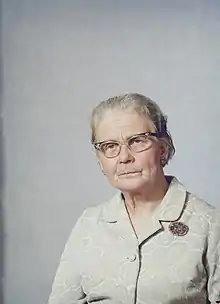Helvi Leiviskä
Helvi Lemmikki Leiviskä (25 May 1902 — 12 August 1982) was a Finnish composer, writer, music educator and librarian at the Sibelius Academy.
Helvi Leiviskä | |
|---|---|
 Helvi Leiviskä in 1972. | |
| Born | 25 May 1902 Helsinki, Finland |
| Died | 12 August 1982 Helsinki, Finland |
| Occupation | Composer |
Life
Helvi Leiviskä was born in 1902 in Helsinki, Finland, and in 1927 graduated in composition from the Helsinki Music Institute (Sibelius Academy) where she studied with Erkki Melartin. She continued her studies in Vienna, and then returned to Finland where she studied with Leevi Madetoja.[1][2]
She began work as a composer with a debut in 1935 and also worked as a music teacher privately and in public schools from 1922 to 1938. In 1933 she took a position as librarian at the Sibelius Academy.[1]
After World War II, Leiviskä furthered her studies with Leo Funtek and wrote reviews for periodicals including Ilta-Sanomat as well as articles for several publications.[1]
Selected works
- Piano Concerto, 1935
- Triple Fugue for Orchestra, 1938
- Symphony No. 1, 1947
- Symphony No. 2, 1954
- Symphony No. 3, 1971
- Sinfonia Brevis, 1962
- Folk Dance Suite (Kansantanssisarja), 1934
- Hobgoblin of Darkness (Pimeän peikko), 1942
- The Lost Continent (Mennyt manner) for choir and orchestra, 1957
- Juha (film music), 1937
- Violin Sonata, 1945[4]
- Piano Quartet, 1926
Discography
- Helvi Leiviskä: Violin Sonata, Piano Quartet, Symphony No. 3. Finlandia Classics FINCLA-1 (2012).
Awards
- Pro Finlandia Medal, 1962
References
- Hillila, Ruth-Esther; Hong, Barbara Blanchard (1997). Historical Dictionary of the Music and Musicians of Finland. Greenwood Publishing Group. pp. 217–. ISBN 0-313-27728-1.
- Sadie, Julie Anne; Samuel, Rhian (1994). The Norton/Grove dictionary of women composers. ISBN 0-393-03487-9. Archived from the original on 31 October 2021. Retrieved 4 October 2010.
- Helvi Leiviskä at Music Finland.
- "Leiviskä at last". FMQ. 2017-08-21. Retrieved 2020-03-22.